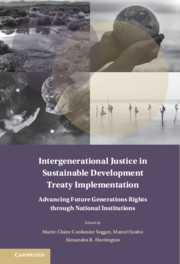 Intergenerational Justice in Sustainable Development Treaty Implementation
Intergenerational Justice in Sustainable Development Treaty Implementation from Part II - Key Challenges in Domestic Implementation of Intergenerational Justice
Published online by Cambridge University Press: 15 October 2021
As a starting point, this chapter examines how frequently future generations language is used in international legal documents. It finds that in the last few decades surprisingly many binding and less-than-binding international legal documents – and not only environmental ones – refer to future generations. However, since these references are seldom made in the main body of the binding international treaties, the force of ‘future generations language’ is questionable. Even so, these declarations of the will of the international legal community impact laws on all levels, most importantly the use of future generations language in the national constitutions that were created or amended recently. Unfortunately, the impulse for development of international law on intergenerational justice has broken after the splendid years of the 1990s. The international community has experienced a significant decline in mentioning and dealing with future generations in the sources of international law since then. The negative socio-economic developments since the 1990s served as the major hindrance to continuation of intergenerational features in our laws, as policy focused elsewhere.
To save this book to your Kindle, first ensure [email protected] is added to your Approved Personal Document E-mail List under your Personal Document Settings on the Manage Your Content and Devices page of your Amazon account. Then enter the ‘name’ part of your Kindle email address below. Find out more about saving to your Kindle.
Note you can select to save to either the @free.kindle.com or @kindle.com variations. ‘@free.kindle.com’ emails are free but can only be saved to your device when it is connected to wi-fi. ‘@kindle.com’ emails can be delivered even when you are not connected to wi-fi, but note that service fees apply.
Find out more about the Kindle Personal Document Service.
To save content items to your account, please confirm that you agree to abide by our usage policies. If this is the first time you use this feature, you will be asked to authorise Cambridge Core to connect with your account. Find out more about saving content to Dropbox.
To save content items to your account, please confirm that you agree to abide by our usage policies. If this is the first time you use this feature, you will be asked to authorise Cambridge Core to connect with your account. Find out more about saving content to Google Drive.